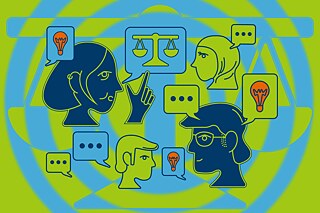Inputs Talks
Modeling Stage - Input Talks on Ethical Dimensions

Wed, 28.09.2022 9:30 AM - 11:00 AM
Online
Schedule
09:30 Michael Puntschuh and Lena Rickenberg (iRightsLab Berlin): Why It Matters When Mobility Data is Biased – Exploring the Gender Data Gap
What do mobility sharing services, crash test dummies and mobility surveys have in common? They all have wide Gender Data Gaps: Unequal data basis on mobility demands and needs from different genders. Often we don’t notice these gaps in our everyday mobility or we simply are not aware that such gaps even exist. This is a problem as it can result in discrepancies in transport infrastructure: Which kinds of services are offered, where roads and tram lines lead or how cars are built influences directly how we mobile we are. So what if all of these have some form of bias?
So mobility data, the way it is collected and what it reflects, plays a key role here. Politicians, city and transport planners as well as businesses base their decisions on this data. AI is then often employed to derive knowledge from this data or build tools to analyse it. In this presentation we will shed a light on what the Gender Data Gap and what examples of it are. This will show, why a representative data base is central to planning a fair and efficient transport system.
09:45 Q&A
09:55 David Dao (ETH Zürich, GainForest, Cimate Change AI): Using artificial intelligence to help restore the natural world
Land use and land use change play a critical role in our climate, taking up about a quarter of annual anthropogenic emissions of greenhouse gases (GHGs) during 2007-2016. In addition to being a key driver of global warming, careless land use is also destroying valuable ecosystem services and is threatening the livelihood for local populations and a multitude of species. Major conservation and restoration efforts are underway to mitigate and safeguard against these losses, and to highlight the urgency of the issue, 2021-2030 has been declared the “UN Decade on Ecosystem Restoration”. However, we cannot preserve what we cannot measure. Machine learning (ML) can play a significant role in responding to this critical call for action and can accelerate the conservation and sustainable use of our natural world - but only when we develop it in co-design with local communities.
10:10 Q&A
10:20 Buse Çetin (creative strategist, AI ethicist) and Iyo Bisseck (designer, researcher, artist): Dreaming Beyond AI
Dreaming Beyond AI is a multi-disciplinary and collaborative web-based project bringing together artists, researchers, activists, and policymakers to create new narratives and visions around AI technologies. The project aims to enable understanding the impact of AI technologies on inequity, and questioning mainstream AI narratives as well as imposed visions of the future. Dreaming Beyond AI acts as a container for (re)defining our technological present and possible futures with artistic and activist voices from the margins. The session will provide a quick glance to the themes and topics of the project, and unpack popular misconceptions and flawed foundations of AI – as technology, business, scientific discipline and ideology – to forge new pathways that are feminist, decolonial.
10:35 Q&A and discussion